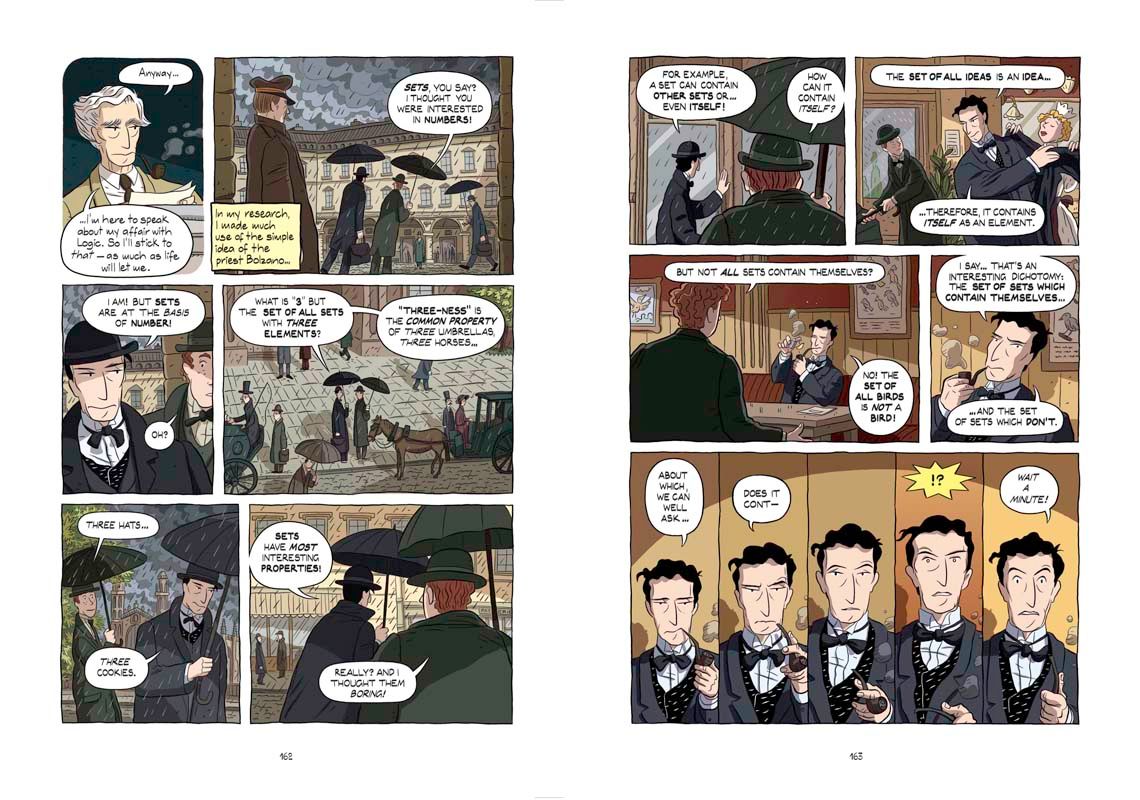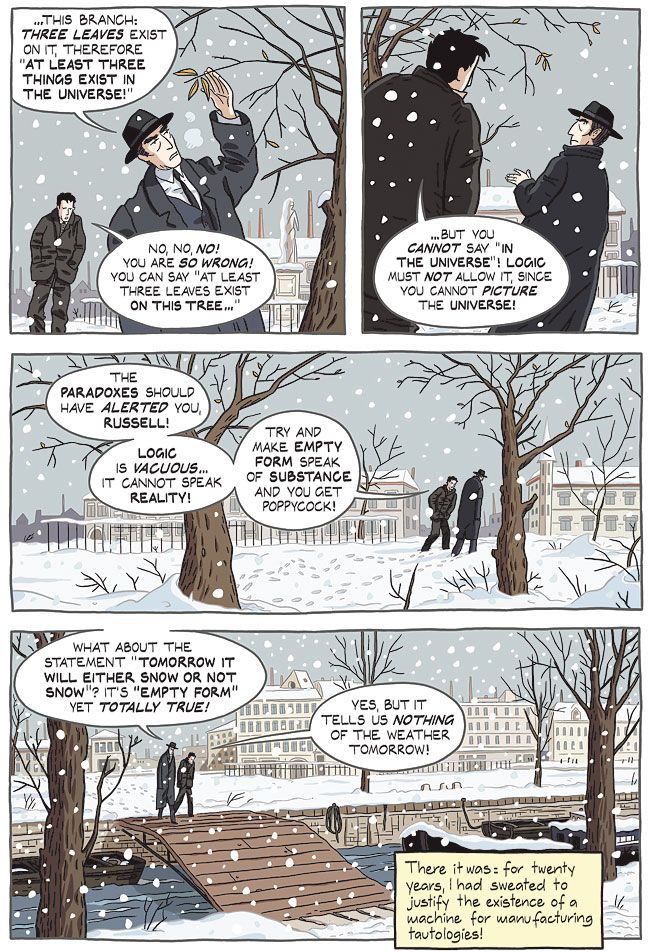
Logicomix, a graphic novel about mathematics and logic, is a pure delight. It reminded me how much I love (and miss) mathematics, not the mathematics of solving equations, but mathematics as a form of thinking.
Logicomix tells the story of the search at the end of the 19th and the beginning of the 20th century for the foundations of mathematics. The key figures in this search were the logician Gottlob Frege, the mathematicians David Hilbert and Georg Cantor, the philosophers Bertrand Russell, Alfred North Whitehead and Ludwig Wittgenstein and the logician Kurt Gödel, who would eventually prove that the whole quest was in vain. If you're familiar with the book's cast Logicomix is a real joy, but don't worry if you aren't, because the book will open up a whole new world for you and reveal a great intellectual adventure. It will show you that mathematics and logic can be fun and why mathematics and logic matter.
The quest is told through the person of Bertrand Russell. We first meet him as he is about to give a lecture at an American university about the role of logic in human affairs. He is met by protesters who demand that he speaks out against the intervention of the U.S. in the second world war. But on what grounds should one decide for or against joining the war, Russell contemplates. He pauses and then suggests that most people would agree that it should be based on reason. But then what is reason? And what is one of the basic tools of reasoning, logic? In a series of flashbacks Russell then recounts his own search for an answer to that question, while pausing at his love affairs, his doubts and his fears.
Interwoven into the story is the story of the making of the novel, which of course is a reference to the kind of paradoxes Russell invented. There are more such self references in both textual and graphic form. Perhaps most surprisingly the novel succeeds as a graphic novel.
The novel also brings out quite brilliantly the intellectual confrontation between Russell and his student Wittgenstein. Some of the novel's best page spreads are about their meeting of minds. Even though their intellectual paths were to diverge they were full of mutual admiration.
In the Tractatus (4.0031) Wittgenstein writes that all philosophy is a "critique of language" and that "it was Russell who performed the service of showing that the apparent logical form of a proposition need not be its real one." Consider the statements "John lives in that house", "Nobody lives in that house" and "The king of France lives in that house". All three have the same grammatical form, but what do "nobody" and "the king of France" refer to? After all, France is a republic and therefore does not have a king. The statement is therefore not true. However to claim that it is false does not make sense either, since the opposite is also not true. Is it a meaningless sentence then? Clearly not, since we do understand it. According to Russell the second sentence should be read as "NOT there is a person, who lives in that house". The third sentence can similarly be paraphrased to give a correct logical form. If this is the kind of problem that intrigues you, you can read more here.
So what about the question that Russell set out to answer during his lecture? If even mathematics and logic cannot be built upon absolute foundations, as Gödel had proved, then what about human affairs? The Russell in the novel answers that this tells us a lot about our conviction that our own views are absolutely right and that in order to resolve moral dilemmas perhaps instead of logic we should try other concepts such as responsibility and justice.
The novel's Russell's answer here doesn't convince me. I also believe that in mathematics, if you choose your axioms, you can construct a firm edifice on those foundations. If you take away the foundations the edifice doesn't collapse, it just floats like an architectural drawing.
It is interesting that the novel ends with the creators, Apostolos Doxiadis, Christos Papadimitriou, Alecos Papadatos and Annie Di Donna, attending a performance of the Oresteia. In the final scene, when it turns out that the numbers of the jury's votes are equal, Athena acquits Orestes. She persuades the Erinyes to accept her verdict telling them that they will be honoured by the citizens of Athens. "If there's a man or a woman who's never felt your anger they're totally ignorant of life's true nature!"
This is really a very Aristotelian position. Aristotle held that the emotions are natural and necessary. As he wrote in the Nichomachean Ethics (1126a4-8) "those who are not angry at the things they should be angry at are thought to be fools, and so are those who are not angry in the right way, at the right time, or with the right persons; for such a man is thought not to feel things nor to be pained by them." But what is right? And what is wrong? More than 2,300 years after Aristotle there is still room for debate.

Links
My review of Ray Monk, Ludwig Wittgenstein. The Duty of Genius. London: Vintage, 1992.